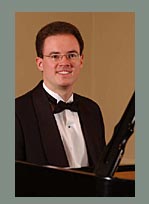 |
 |
 |
Pianist and polymathMatthew BengtsonBy Lucy Miller MurrayWhen stalwart reviewer Susan Pena of the Reading Times described Matthew Bengtson as “both analytical and creative,” she gave a quick but accurate take on him. “Both sides of his brain seem to be perfectly balanced,” she continued. Yes, the brain is a fascinating subject in Bengtson. Just consider his education: a DMA in Piano Performance from the Peabody Institute and an AB in Computer Science (cum laude) from Harvard. And his academic associations: Curtis Institute, University of Pennsylvania, Haverford, Bryn Mawr, Cornell, and Peabody. Currently he is a piano instructor in the undergraduate Private Study programs at Bryn Mawr and Haverford, and at Penn he is a Fellow in the Blutt College House Music Program. At the Curtis Institute he was a staff pianist accompanying students in lessons and recitals and at the Settlement School he was a member of the studio piano and music theory faculty. He was also a Teaching Associate in the Music Theory Department at Peabody and adjunct piano instructor at Cornell. He has also presented workshops at Harvard and at the University of the Arts in Philadelphia. Additional studies have also taken him to the Mozarteum in Salzburg and the Centre Acanthes and Écoles d’Art Américaines in France. Consider also his recently published articles: “The Szymanowski Clash: Harmonic Conflict and Ambiguity in the Szymanowski Mazurkas” (Polish Music Journal), “Interpretative Questions in the Diabelli Variations” (New Beethoven Forum 12), “A Pilgrimage for Scriabin” (Journal of the Scriabin Society of America), and, of course, the Stefan and Wanda Wilk Prize for Research in Polish Music awarded by the University of Southern California for his paper, “The Szymanowski Clash: Methods of Harmonic Analysis in the Szymanowski Mazurkas.” His other awards are many: the La Gesse Foundation Fellowship which supported performances in France and Italy and the French Embassy in Washington, DC, as well as at Monticello in Charlottesville, VA and Carnegie Hall. He was a Lowens Award Finalist at the American Musicological Society, and recipient of the Otto R. Stahl Memorial Prize at Cornell and the Timothy Faron Award at Harvard. At the age of seventeen, he won the Reading Symphony and Pottstown Symphony concerto competitions. Matthew Bengtson is also on the roster of PennPAT (Pennsylvania Performing Arts on Tour) which gives grant support to professional Pennsylvania artists and presenters. If, after all these impressive achievements, you still wonder about his playing, just listen to his recording of the Scriabin sonatas (Romeo Records, 2005). Here is playing that exudes not only intelligence but also great warmth and romanticism, the farthest thing from an academic approach. Lawrence Budmen of the American Record Guide noted the “big-boned pianism, rich tonal colors, and dazzling technique. Has Scriabin ever been played better? Only Horowitz and Richter can compare to what Bengtson achieves on this disc.” Matt Bengtson explains that he grew up with “the big Romantic sound of Chopin and Liszt” even if his musical adventures took him in other directions. Preserving that sound in Scriabin serves him well. Another recording, B! Music of Bach, Bartok, and Brahms, by its very title, reflects the breadth and diversity of his musical interests. He as also recorded the complete mazurkas of Karol Szymanowski, again a meeting of his academic and artistic interests. Other recordings feature the chamber works of Philadelphia area composers David Bennett Thomas and Matt Monticchio He is also currently involved in a multi-CD recording of the Charles West Wilson collection of original English instruments that includes pianos by Broadwood and Longman & Broderip and harpsichords by Slade, Kirkman, and Shudi. The first disc will be released on Griffin Renaissance Records in 2008. In his repertoire, Matt Bengtson has a commitment to new music that includes works by Luciano Berio, György Ligeti, Alberto Ginastera, Witold Lutoslawski, and Toru Takemitsu, to name a few. He has also performed works by some fifteen Philadelphia composers including Curt Cacioppo and Jeremy Gill. And let’s not omit his devotion to French music including, of course, Debussy, Ravel, and Franck, but also Pierre Boulez, Henri Dutilleux, and Olivier Messiaen. His own compositions include Suite for Melomanie: Five Pieces for Baroque Instruments in which he will be guest harpsichordist with the ensemble Melomanie for its Wilmington performance last February. An upcoming Philadelphia area performance is the Music and Conversation program at Haverford on March 18 when he will perform with the Aurelio Ensemble that also includes soprano Laura Heimes, violinist Fran Berge, and cellist Rebecca Humphrey. Some recent past appearances include a Penn Humanities Forum performance in which he accompanied soprano Julianne Baird on harpsichord and fortepiano in a lecture-recital on the history of ornamented song. He also appeared last summer at the Ethical Society for the Philadelphia chapter of the Kosciuszko Foundation with violinist Blanka Bednarz in an all-Szymanowski program. His remarkable “Halloween program” last November in Rittenhouse Square’s Holy Trinity Church (repeated at Penn at 11 p.m.) brought together Prokofiev’s Suggestion Diabolique, Scriabin’s Black Mass Sonata, Ravel’s Gaspard de la Nuit, Ligeti’s étude The Devil’s Staircase, and Liszt’s Mephisto Waltz. How’s that for a terrifying program! In 2007 he the performed the Bach Goldberg Variations at the Franz Liszt Museum in Budapest, in Triberg, Germany, and in Toulouse, France. In Carnegie Hall’s Weill Recital Hall, he performed both the Goldberg Variations and Ravel’s Gaspard de la Nuit, two of the most intellectually and technically intimidating works of the entire keyboard repertoire. Yet Matt approaches Bach and Ravel with the same aplomb it takes to play a good game of chess: understanding, concentration, discipline, hard work, and, not the least, passion. That brings us back to the other side of his brain. In addition to a Harvard education that focused on mathematics and computer science, Matt Bengtson reads Latin and Greek, is a three-handicap golfer, and a chess FIDE master. About this last interest, Goethe said, “Chess is the touchstone of the intellect.” So it is with Matt’s commitment to this complex pastime. On his website (www.mattbengtson.com) he proudly displays a picture of his playing for the Cornell chess team in Singapore, one his many world-wide adventures in this pursuit. Matt is currently president of the Penn Go Society, an organization dedicated to the ancient Asian strategy game which now, says Matt, has taken the place of chess in his life. That transition we might leave for a whole other article. About playing three instruments Matt Bengtson is modest and practical. He does not practice all three at the same time but goes through what he calls “phases” where the complexity of each instrument is addressed individually. His harpsichord studies at Peabody as well fortepiano work with Robert Levin at Harvard and Malcolm Bilson at Cornell serve as fine preparations for the difficulties of the instruments. This is to say nothing, of course, about all sides of Matt Bengtson’s brain working to feed the creative energy he pours into his music, be it harpsichord, fortepiano, or a modern Steinway. Somehow he makes it all work.
to send e-mail to Matthew Bengtson. Copyright
2002-2008 Matthew Bengtson |